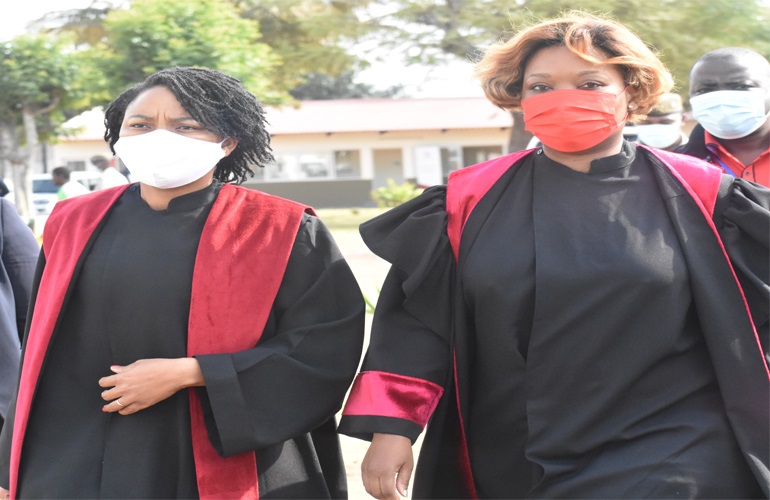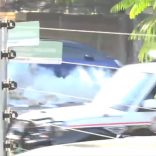South Africa: Police thwart smuggling attempt of 20 stolen vehicles from KwaZulu-Natal to Mozambique
“Hidden debts” trial: 30 August 2021- AIM reports

Photo:Noticias
- Guebuza’s son denies it all
Ndambi Guebuza, the oldest son of former Mozambican President Armando Guebuza, told the Maputo City Court on Monday that he had nothing to do with the project, designed in 2011, to set up a scheme to protect Mozambique’s Exclusive Economic Zone (EEZ), and denied receiving any money from the Abu Dhabi based group Privinvest.
The EEZ protection project had, by 2012, mutated into Proindicus, the first of three fraudulent companies at the heart of the largest financial scandal in Mozambican history, known as the hidden debts. Guebuza is one of 19 people on trial for their part in the scandal.
Hs testimony clashed sharply with that given last week by the first two of the defendants questioned, businessman Teofilo Nhangumele and Cipriano Mutota, the former director of the studies and projects office of the State Security and Intelligence Service (SISE), both of whom said he had a prominent role in the early stages of the coastal protection project, for which Privinvest paid him a bribe of 33 million US dollars.
Unfortunately for Guebuza, there is a great deal of evidence against him, in the shape of email messages and bank correspondence, which prosecutors found on his computer, seized when his house was searched.
These messages show Nhangumele, talking about the coastal protection project, the need for a “Special Purpose Vehucle” to run it (which became Proindicus), and financing in the shape of a loan from the bank Credit Suisse,
Despite the trail of emails, Guebuza Junior denied any involvement in the project, and initially claimed that the first time he had met Nhangumele was when they were both in prison. However, there is photographic evidence of Guebuza, his friend Bruno Langa, and Nhangumele, all travelling in the same private plane (owned by Privinvest) on a trip to Abu Dhabi.
In his testimony, Nhangumele had said that he, Langa, Guebuza, and the SISE head of economic intelligence, Antonio do Rosario, had all visited Privinvest shipyards in Germany and Abu Dhabi. Guebuza admitted going to the German port of Kiel, but claimed he was on other business that had nothing to do with Privinvest. He said he was one of the partners in a project to turn gas into liquid fuels.
Asked who paid for the trip to Germany, he said he did not know, but all the logistics was handled by protocol officers in his father’s office. So a trip from Maputo to Kiel, for private citizens, was organized by the Mozambican state.
Guebuza admitted to making several trips to Abu Dhabi, which he believed were paid for by Privinvest. Although he has never lived in the United Arab Emirates, and is not an employee of Privinvest he obtained a resident’s visa, on the grounds that he was one of Privinvest’s hydraulic mechanics.
But Guebuza is not a mechanic, and when the judge, Efigenio Baptista, pointed out that he obtained the visa under false pretenses, he insisted “it’s all perfectly legal”.
To many of the judge’s questions, Guebuza replied that it had all happened a long time ago, and he could not remember. “I don’t have an elephant’s memory”, he protested.
Baptista retorted that he wasn’t interested in elephants. “We just want the memory of a normal person”, he said.
Guebuza used his resident’s visa to open a bank account in Abu Dhabi. According to the prosecution, Privinvest deposited a bribe of 33 million dollars into this account. But Guebuza denied ever receiving any money from Privinvest, and said he could not even remember the name of the bank.
He said he had never done any work for Privinvest. So, why asked the judge, did Privinvest send a private plane to pick him up in Maputo, why did it arrange a resident’s visa and a bank account for him, and why did it pay for his stays in Abu Dhabi? “What did they expect in return?”, Baptista asked.
The first installment of the bribe was 14 million dollars, which entered Guebuza’s Abu Dhabi account on 25 March 2013. He vehemently denied received such vast sums, and claimed that any emails and other documents that say otherwise must be forgeries.
Baptista pointed out that the documents were all on Guebuza’s computer, and so was the receipt he had signed confirming that the money had been deposited.
Guebuza insisted it was all fake and that his signature too had been forged.
- Pesticides in the pudding, accused tells court
The trial in the case of Mozambique’s “hidden debts” took an unexpected turn on Monday afternoon, as one of the best-known of the accused, Ndambi Guebuza, the oldest son of former President Armando Guebuza, lost his temper and claimed the trial was part of a gigantic conspiracy against the Guebuza family.
“You’re liars!”, he told the prosecuting attorney, Sheila Marrengula. The Attorney-General’s Office (PGR), he accused “is persecuting my family and the veterans of the independence war”.
He even claimed that part of the conspiracy was an attempt to poison his family by putting “pesticides in the pudding”. As further “evidence” for his claims he cited the murder of his sister Valentina in 2016, although it is no secret that she was the victim of an abusive husband.
For good measure, he threw in the claim that the current president, Filipe Nyusi, is aiming to secure a third term of office. The same claim was once made about his father, and about his processor, Joaquim Chissano. But the Constitution states that no president may serve more than two consecutive five year terms, and so far nobody has made any serious attempt to change that constitutional principle.
The judge, Efigenio Bapista, repeatedly rebuked Guebuza for showing lack of respect to the court and particularly towards Marrengula.
He refused to answer many of the questions about his financial affairs raised by both Baptista and Marrengula.
After his initial denial that he had ever received bribes from the Abu Dhabi based group Privinvest, he was at a loss to explain how Privinvest money was sent for his use to various South African companies though which he obtained houses and luxury cars.
He claimed these financial transfers arose from “a partnership” between himself and senior Privinvest official Jean Boustani. He would give no details of this “partnership”, and refused to make any comments on the financial transactions with South African concerns which the judge listed in great detail.
The cars which Guebuza obtained through this unexplained arrangement included Rolls Royces, Aston Martins, Ferraris, Maseratis, and Range Rovers.
He also acquired real estate in Pretoria, and when Marrengula cited the address of one of these houses, and asked whether he did indeed own it, Guebuza declared “You’re using me to wage a political campaign!”
One of the strangest gifts from Privinvest was a consignment of 8,829 bottles of wine, weighing over eight tonnes, and sent to the Mozambican President’s office.
Boustani sent Guebuza Junior an email congratulating him on the safe arrival of the wine. Why, Marrangula asked, did Boustani congratulate him, if he really had nothing to do with Privinvest?
Did he check the wine?, she asked. And had the appropriate customs duty been paid on these drinks? Guebuza said he had no idea who handled customs declarations at the presidency.













Leave a Reply
Be the First to Comment!
You must be logged in to post a comment.
You must be logged in to post a comment.